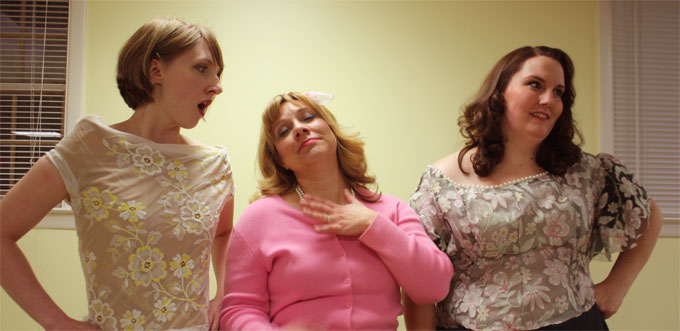Next story: Round 3, Week 1: Letterbox vs. Wild Things
Mozart and Love
by Jan Jezioro

To celebrate the opening of its 30th anniversary season, Buffalo Opera Unlimited will present Mozart’s opera Così fan tutte in the Drama Theatre of the Center for the Arts on the UB Amherst Campus on Friday March 13 at 8pm and on Sunday March 15 at 2:30pm.

Così fan tutte is an opera that is genuinely, if very wittily, concerned with the mystery of love and the almost inevitable complications arising from that state. Love is treated with the kind of gentle grace, tempered occasionally by elements of popular humor, that only Mozart and Lorenzo da Ponte, the most ‘simpatico’ librettist that he ever worked with, were capable of crafting into a masterpiece that is very arguably more popular now that at any time since its premiere in 1790, but more about that later.
The cast includes Rebecca Witty, the third place winner of the recent Metropolitan Opera National Council Audition for the Great Lakes Region, as Fiordiligi, and Mary Kate vom Lehm as Dorabella, the female lovers, while Amy Teal is Despina, their loveably scheming servant. Nicholas Kilkenny, as Guglielmo and Robert Zimmerman as Ferrando, are their all-too-confident boyfriends, while Alfonzo Tyson portrays Don Alfonso, the world-weary philosopher who sets the action rolling with his challenge to the hot-blooded young soldiers about the fidelity of their girlfriends.
The topic of love in Così fan tutte is an appropriate theme that can also be applied to describe the efforts of Tim Kennedy, the founding artistic director of Buffalo Opera Unlimited, who has remained at that organization’s helm for the last thirty years, for an ongoing project which can be best understood as a labor of love.
“I would like to emphasize the plight of the classically trained vocal student and the effort of Buffalo Opera Unlimited for the past 30 years to address this issue by giving local and regional trained singers an opportunity to sing opera,” says Kennedy. “The statistics of trained classical singers making a living from their craft is dreadful. The financial debt for many aspiring singers is catastrophic and many are forced to leave the profession or experience financial ruin. We have a small company but we have persevered and tried to help in as many ways as possible. We began by doing small adaptations of operatic pieces with piano and small instrumental ensembles for 16 years and grew to produce full scale productions. This could not have happened without the financial support of our opera audience, including donations from our individual donors as well as foundations and banks.”
“We’re using 18 instrumentalists, as scored, and I’ll be conducting,” says Kennedy. “We are using a 1950’s theme with elements from that era in a chamber style Così with only the six principal singers. David Butler is designing the set and has promised to use some ideas of Pollack and Rothko in the first Cafe scene, and I can’t wait to see it. The lighting is done by Patty Rihn, a member of the CFA staff, and the costumes will be designed by Bernadine De Mike, our costumer for over a decade, who is a multi-talented artist totally dedicated to her craft.”
“The genius of Mozart’s music is always first for me,” says Kennedy. “The incredible ensembles of Così, whether they are duets, trios, quartets or sextets always draw me back to this masterpiece. The theme of infidelity is scrutinized playfully and seriously which still remains a conversation which causes serious debate and all kinds of discomfort when you analyze the plot of Così.”
Initially accepted as a comic, but melancholy tinged comment on the vagaries of love, Così fan tutte all too quickly fell into disrepute in the burgeoning early Romantic era of the early 19th century, which condemned what was then viewed as its lightheartedness and risqué frivolity, qualities that ensured its continuing neglect throughout the Victorian era and well into the 20th century. Amazingly, the opera had to wait for its American premiere until a 1922 Metropolitan Opera production. Thankfully, Così has long since taken its well-deserved place as one on the most often performed operas in the repertoire.
“One of our biggest concerns at BOU has always been having more people attend our performances,” says Kennedy. “What better composer to attract newcomers than Mozart and his operas, especially if sung in English. Yes, anything I could say about Mozart’s genius would be trite. The man was supernatural, and his insight, both into his characters and into combining melancholy with comedy is extraordinary, as shown in Così. His form and symmetry is unequaled in the many genres in which he composed. Many of the voices I use are somewhat light in quality, which I admire because they are relatively young and that quality readily lends itself to Mozart’s vocal writing style.”
Tickets: at the Center for the Arts Box Office (1-888-223-6000) and at www.tickets.com.
General $30/Senior $25/Student $10.
blog comments powered by Disqus|
Issue Navigation> Issue Index > v14n9 (Week of Thursday, March 5) > Mozart and Love This Week's Issue • Artvoice Daily • Artvoice TV • Events Calendar • Classifieds |









 Current Issue
Current Issue